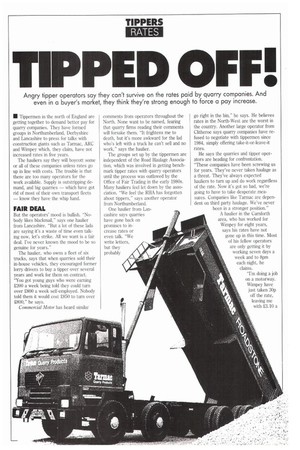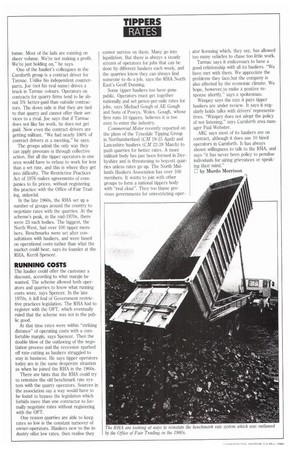TIPPED OFF!
Page 50

Page 52

If you've noticed an error in this article please click here to report it so we can fix it.
Angry tipper operators say they can't survive on the rates paid by quarry companies. And even in a buyer's market, they think they're strong enough to force a pay increase.
• Tippermen in the north of England are getting together to demand better pay for quarry companies. They have formed groups in Northumberland, Derbyshire and Lancashire to press for talks with .construction giants such as Tarmac, ARC and Wimpey which, they claim, have not increased rates in five years.
The hauliers say they will boycott some or all of these companies unless rates go up in line with costs. The trouble is that there are too many operators for the work available. Supply is outstripping demand, and big quarries — which have got rid of most of their own transport fleets — know they have the whip hand.
FAIR DEAL
But the operators' mood is bullish. "Nobody likes blackmail," says one haulier from Lancashire. "But a lot of these lads are saying it's a waste of time even talking now, let's strike. All we want is a fair deal. I've never known the mood to be so genuine for years."
The haulier, who owns a fleet of six trucks, says that when quarries sold their in-house vehicles, they encouraged former lorry drivers to buy a tipper over several years and work for them on contract. "You got young guys who were earning 200 a week being told they could turn over .£800 a week self-employed. Nobody told them it would cost E850 to turn over 800," he says.
Commercial Motor has heard similar
comments from operators throughout the North. None want to be named, fearing that quarry firms reading their comments will forsake them. "It frightens me to death, but it's more awkward for the lad who's left with a truck he can't sell and no work," says the haulier.
The groups set up by the tippermen are independent of the Road Haulage Association, which was involved in getting benchmark tipper rates with quarry operators until the process was outlawed by the Office of Fair Trading in the early 1980s. Many hauliers feel let down by the association. "We feel the RHA has forgotten about tippers," says another operator from Northumberland.
One haulier from Lancashire says quarries have gone back on promises to increase rates or even talk. "We write letters, but they probably go right in the bin," he says. He believes rates in the North-West are the worst in the country. Another large operator from Clitheroe says quarry companies have refused to negotiate with tippermen since 1984, simply offering take-it-or-leave-it rates.
He says the quarries and tipper operators are heading for confrontation. "These companies have been screwing us for years. They've never taken haulage as a threat. They've always expected hauliers to turn up and do work regardless of the rate. Now it's got so bad, we're going to have to take desperate.measures. Companies like Tarmac are dependent on third party haulage. We've never been in a stronger position." A haulier in the Carnforth area, who has worked for Wimpey for eight years, says his rates have not gone up in this time. Most of his fellow operators are only getting it by working seven days a week and to 8pm each night, he claims.
"I'm doing a job on a motorway. Wimpey have just taken 30p off the rate, leaving me with £3.10 a tonne. Most of the lads are existing on sheer volume. We're not making a profit. We're just holding on," he says.
One of the haulier's colleagues in the Carnforth group is a contract driver for Tarmac. Unlike his independent counterparts, Joe (not his real name) drives a truck in Tarmac colours. Operators on contracts for quarry firms tend to be about 5% better-paid than outside contractors. The down side is that they are tied to that quarry and cannot offer their services to a rival. Joe says that if Tarmac does not like his work, he does not get paid. Now even the contract drivers are getting militant. "We had nearly 100% of contract drivers at a meeting," he says.
The groups admit the only way they can apply pressure is through collective action. But all the tipper operators in one area would have to refuse to work for less than a set rate, and this is where they get into difficulty. The Restrictive Practices Act of 1976 makes agreements of companies to fix prices, without registering the practice with the Office of Fair Trading, unlawful.
In the late 1960s, the RHA set up a number of groups around the country to negotiate rates with the quarries. At the scheme's peak, in the mid-1970s, there were 23 such bodies. The biggest, the North West, had over 100 tipper members. Benchmarks were set after consultations with hauliers, and were based on operational costs rather than what the market could bear, says its founder at the RHA, Kerril Spencer.
RUNNING COSTS
The haulier could offer the customer a discount, according to what margin he wanted. The scheme allowed both operators and quarries to know what running costs were, says Spencer. In the late 1970s, it fell foul of Government restrictive practices legislation. The RHA had to register with the OFT, which eventually ruled that the scheme was not in the public good.
At that time rates were within "striking distance" of operating costs with a comfortable margin, says Spencer. Then the double blow of the outlawing of the negotiation process and the recession sparked off rate-cutting as hauliers struggled to stay in business. He says tipper operators today are in the same desperate situation as when he joined the RHA in the 1960s.
There are hints that the RHA could try to reinstate the old benchmark rate system with the quarry operators. Sources in the association say a way would have to be found to bypass the legislation which forbids more than one contractor to formally negotiate rates without registering with the OFT.
One reason quarries are able to keep rates so low is the constant turnover of owner-operators. Hauliers new to the industry offer low rates, then realise they cannot survive on them. Many go into liquidation. But there is always a steady stream of operators for jobs that can be done by different hauliers each week, and the quarries know they can always find someone to do a job, says the RHA North East's Geoff Dunning.
Some tipper hauliers too have gone public. Operators must get together nationally and set pence-per-mile rates for jobs, says Michael Gough of AE Gough and Sons of Powys, Wales. Gough, whose firm runs 10 tippers, believes it is too easy to enter the industry.
Commercial Motor recently reported on the plans of the Tynedale Tipping Group in Northumberland (CM 19-25 April) and Lancashire hauliers (CM 22-28 March) to push quarries for better rates. A more militant body has just been formed in Derbyshire and is threatening to boycott quarries unless rates go up. The North Midlands Hauliers Association has over 100 members. It wants to join with other groups to form a national tippers body with "real clout". They too blame previous governments for unrestricting oper
ator licensing which, they say, has allowed too many vehicles to chase too little work.
Tarmac says it endeavours to have a good relationship with all its hauliers. "We have met with them. We appreciate the problems they face, but the company is also affected by the economic climate. We hope, however,to make a positive response shortly," says a spokesman.
Wimpey says the rate it pays tipper hauliers are under review. It says it regularly holds talks with drivers' representatives. "Wimpey does not adopt the policy of not listening," says Carnforth area manager Paul Webster.
ARC says most of its hauliers are on contract, although it does use 10 hired operators in Carnforth. It has always shown willingness to talk to the RHA, and says "it has never been policy to penalise individuals for airing grievances or speaking their mind."
E by Murdo Morrison








































































































































































